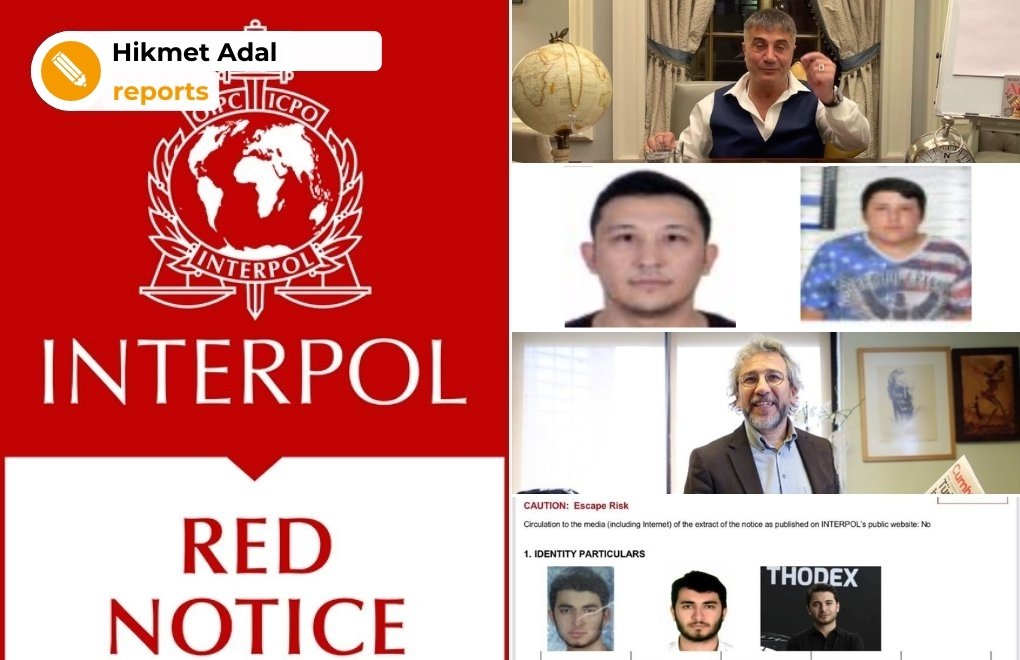Click to read the article in Turkish
Journalist Can Dündar on one side, and Sedat Peker, who is accused of "leading an organized crime group," is on the other. What brings them together in the same news article is the red notices that Interpol refuses to issue.
For a long time now, Interpol has been rejecting Turkey's applications for a red notice for political figures, which Minister of Interior Süleyman Soylu complained about during a TV program on May 24.
When asked about whether a red notice was issued for Peker, he had replied, "About the red notice, we immediately filed a complaint. You know we got it within two-and-a-half hours for Thodex [alleged cryptocurrency fraud)].
"You know, [Peker] has an arrest warrant against him in İstanbul, Bursa and İzmir. [Interpol] put [our application] in the section that is called "diffusion." We can't seek FETÖ members with a red notice. We make an application, they put it in the diffusion section and say it's 'irrelevant'."
The situation is the same for Dündar. The İstanbul 14th Heavy Penal Court, which is trying Dündar in the "MİT trucks case," frequently requests a red notice for the journalist.
However, the only known official request by Turkey to Interpol regarding Dündar was made in 2018. The court ruled in the last hearing on June 8 that a red notice should be issued for Dündar. A day later, Interpol's General Secretariat stated that there had been no new requests by Turkey.
How is a red notice issued?
The red notice is not the only type of notice that Interpol issues for international cooperation. It also has blue, green, black, yellow and orange notices and the "UNSC Special Notice."
Every type of notice has a different meaning but they all allow the countries to share their warnings and requests for information globally.
The red notice is a request for the "arrest and extradition of criminals." Its legal basis can be an arrest warrant issued by courts or a court ruling.
In Turkey, the court ruling or the request of the prosecutor's office is forwarded to the Ministry of Justice. If the ministry's General Directorate of International Law and Foreign Relations deems it appropriate, it sends the request to the Interpol Department of the General Directorate of Security, which then sends it to the Interpol General Secretariat.
Interpol regulations
Notices from countries are only issued if they comply with Interpol's regulations and meet all legal requirements.
But most member states see the red notice as a valid request for temporary arrest. Since the red notice has no power of sanction, the person concerned can't be extradited solely on the basis of this request. Extradition proceedings must be made in the country where the extradition request is made. The person should stand an "extradition trial" in the country that receives the request.
If the court decides that there is no legal problem within the framework of the national legislation regarding the extradition of the person, it can issue an extradition order. The person whose extradition is requested can appeal an extradition order.
"Diffusions"
Lately, Interpol carefully scrutinizes the red notice requests by Turkey and does not accept requests that it considers to be "political." Diffusions, or less formal notices, can be applied when a red notice request is rejected.
Two public red notices by Turkey
There are currently 66,370 red notices in Interpol's system. While most of the red notices are restricted to law enforcement use only, 7,669 red notices are public.
In the public list, there are three notices for people from Turkey: Mehmet Aydın and Fatih Aydın, who are held responsible for the "Çiftlik Bank" fraud and Faruk Fatih Özer for the Thodex cryptocurrency fraud.
On the public list, there are notices for 30 citizens of Turkey. Nine of them have notices against them because of drug-related crimes.
How many people were extradited?
Deputy Minister of Foreign Affairs Yavuz Selim Kıran said last week that 93 people had been extradited to Turkey and Turkey had extradited three people since
In recent years, Turkey does not care about the principles of international organizations that it is a member of and does not comply with agreements. Because of that, international organizations don't find Turkey reliable. The simplest example of this is the European Court of Human Rights (ECtHR) rulings for Selahattin Demirtaş and Osman Kavala.
In both cases, the ECtHR ruled that the arrests were "political" and both applicants should be released immediately. Turkey has failed to abide by this ruling for two years. The Council of Europe is considering stripping Turkey of its veto rights.
An Interpol spokesperson told DW Turkish that they had reminded Turkey of Interpol's obligation to abide by its rules and of the Universal Declaration of Human Rights. (HA/VK)










